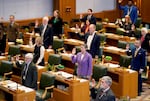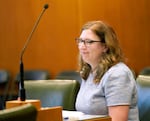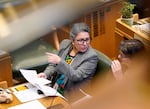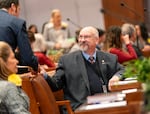
Oregon Gov. Tina Kotek, delivers the state of the state speech to a joint session of the Legislature ahead of the 2025 legislative session, at the Oregon State Capitol in Salem, Jan. 13, 2025.
Kristyna Wentz-Graff / OPB
Oregon Gov. Tina Kotek on Monday pitched state lawmakers on a “brighter horizon” for some of the state’s most daunting issues — if they agreed to follow her lead.
In a state of the state address delivered at the halfway point of her four-year term, Kotek dwelled on the three issues that have most animated her administration: a housing and homelessness crisis, a frayed and overtaxed behavioral healthcare system, and flagging student test scores.
“I am renewing a conversation with you about Oregon’s future and how we build shared prosperity over the next two years,” Kotek told a House chamber packed with lawmakers, state justices and dignitaries. “We are making progress, despite entrenched challenges, but that progress is fragile and requires all of us to be persistent and not get distracted.”
Coming roughly a week before legislators gavel in a session expected to last through June, the speech offered few revelatory antidotes.
On housing, she urged lawmakers to get creative in terms of speeding up the pace at which new units are built.
Kotek has approved billions in spending to address housing and homelessness since becoming governor in 2023, but has so far failed to reduce the state’s growing homelessness numbers or meaningfully juice the addition of new homes. A long-shot goal of adding 36,000 units a year set by the governor when she took office remains far out of reach.

Gov. Tina Kotek delivers the state of the state address during a joint session at the Oregon state Capitol in Salem, Ore., Jan. 13, 2025.
Kristyna Wentz-Graff / OPB
“I am impatient about the pace of progress, and some days just plain angry that we’re in this predicament at all and that we can’t move faster to get more housing built,” said Kotek. “Please, my friends, let’s do more, let’s be bolder.”
On behavioral health, Kotek highlighted the increasing inability of the Oregon State Hospital to admit people in profound mental health crises. Most of the facility’s beds are taken up by people charged with crimes, who have been deemed unable to assist in their own defense.
She touted a proposed budget she unveiled last year, which would create hundreds of new treatment beds, and said the state could better link people in homeless shelters to mental health services.
Kotek also took a stance on an issue that is likely to generate significant debate in the upcoming legislative session, saying she supported lowering the legal threshold to humanely civilly commit people experiencing mental illness. “Why is it okay that we watch very ill people harm themselves because we are unwilling or unable to get them the health care they so desperately need?” she said.
And on education, the governor signaled she would tie increased funding to schools — another feature of her proposed budget — to stronger requirements that districts use that money wisely. Recent test scores offer a deflating picture of student achievement in Oregon, which remains below pre-pandemic levels and signals low proficiency in English, science and math.
Kotek told lawmakers that a $600 million funding boost she wants to send to K-12 schools is “not a blank check.”
“I will be bringing forth a plan that will emphasize stewardship of resources, measurable outcomes, and transparency,” Kotek said. She added: “The bottom line is this: When a district’s numbers show failure for their students, there will be help and attention — not voluntarily requested, but required.”
While the governor spent much of her speech on her three top issues, she gave glancing attention to other big priorities.
On wildfire preparedness, she repeated her call for lawmakers to hold back $150 million that would otherwise go to the state’s Rainy Day Fund in order to fund the next wildfire season.
“Call it money for a very, very bad smoky day,” Kotek said.
Kotek also called on lawmakers to find “at least $130 million every two years” to prevent and battle fires. In December, after a record year that burned nearly two million acres, lawmakers were forced to go into special session to pay off wildfire bills that hit $350 million — by far the most expensive fire season in state history.
The governor only briefly touched on the question of funding for the state’s Department of Transportation, expected to be one of the legislative session’s top debates, along with an ongoing public defense shortage and a problem-riddled system for foster kids.
“The choices we make as leaders will have a ripple effect on generations to come,” Kotek closed. “We do not always agree on what those choices are, but I encourage each and every one of us to rise above the maze of politics — its false starts, circles, and dead ends — and see the path forward.”
The address was the culmination of a day that marked the unofficial start to the state’s 2025 legislative session.
Earlier in the day, the state’s 90 legislators took their oaths of office for a new term, and chose their chamber leaders.

Oregon state Sen. Rob Wagner, D-Lake Oswego, left, is handed the gavel after being sworn in as Senate President, Jan 13, 2025, at the Oregon state Capitol in Salem, Ore.
Kristyna Wentz-Graff / OPB
Over the clatter of an ongoing seismic retrofit at the Oregon State Capitol, the Senate chose Senate President Rob Wagner, D-Lake Oswego.
On the other side of the building, the House of Representatives tapped House Speaker Julie Fahey, D-Eugene, for another two years. That chamber’s 36 Democrats unanimously favored Fahey over the Republican’s choice: House Minority Leader Christine Drazan, R-Canby.
In a speech following the vote, Fahey called on both parties to “put our responsibility to the people of Oregon and our constitution first.”
“Each of us must commit the best of our abilities to this work,” she said, describing a legislative agenda that includes cutting costs on housing, health care, and utilities; funding transportation; increasing legislative oversight of state agencies; and fending off overreach by the incoming Trump administration.
“I’m excited to take on this challenge with all of you,” Fahey said. “Let’s get to work!”
Despite holding a minority in both chambers, Republicans in the state Legislature signaled they are preparing to fight against Democratic overreach in the upcoming legislative session. Following the governor’s speech, Republican leaders were frank in their assessment, calling Kotek’s tenure an “abject failure” and blasting her speech as “uninspiring” and lacking in vision.

Oregon state Rep. Julie Fahey, D-Eugene, is sworn in as House Speaker, Jan. 13, 2025, at the Oregon state Capitol in Salem, Ore.
Kristyna Wentz-Graff / OPB
House Republican Leader Christine Drazan, who ran against Kotek for the state’s highest office in 2022, said the governor’s speech was a “doubling down on the status quo and the failed policies of the past.”
Drazan said the governor’s education policies have hurt students and families, and rather than supporting teachers in the classroom, they have added layers of unnecessary bureaucracy.
Senate Republican Leader Daniel Bonham, R-The Dalles, said the governor has failed on her primary mission of improving the housing and homelessness crisis in the state. The Republican leaders said Kotek’s speech was uninspiring and lacked a compelling vision.
”The one thing we can promise you is Republicans are coming to Salem to fight,” Bonham said.


























